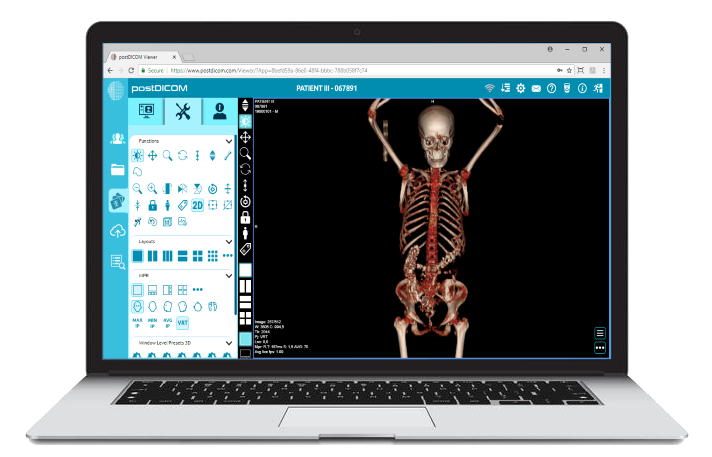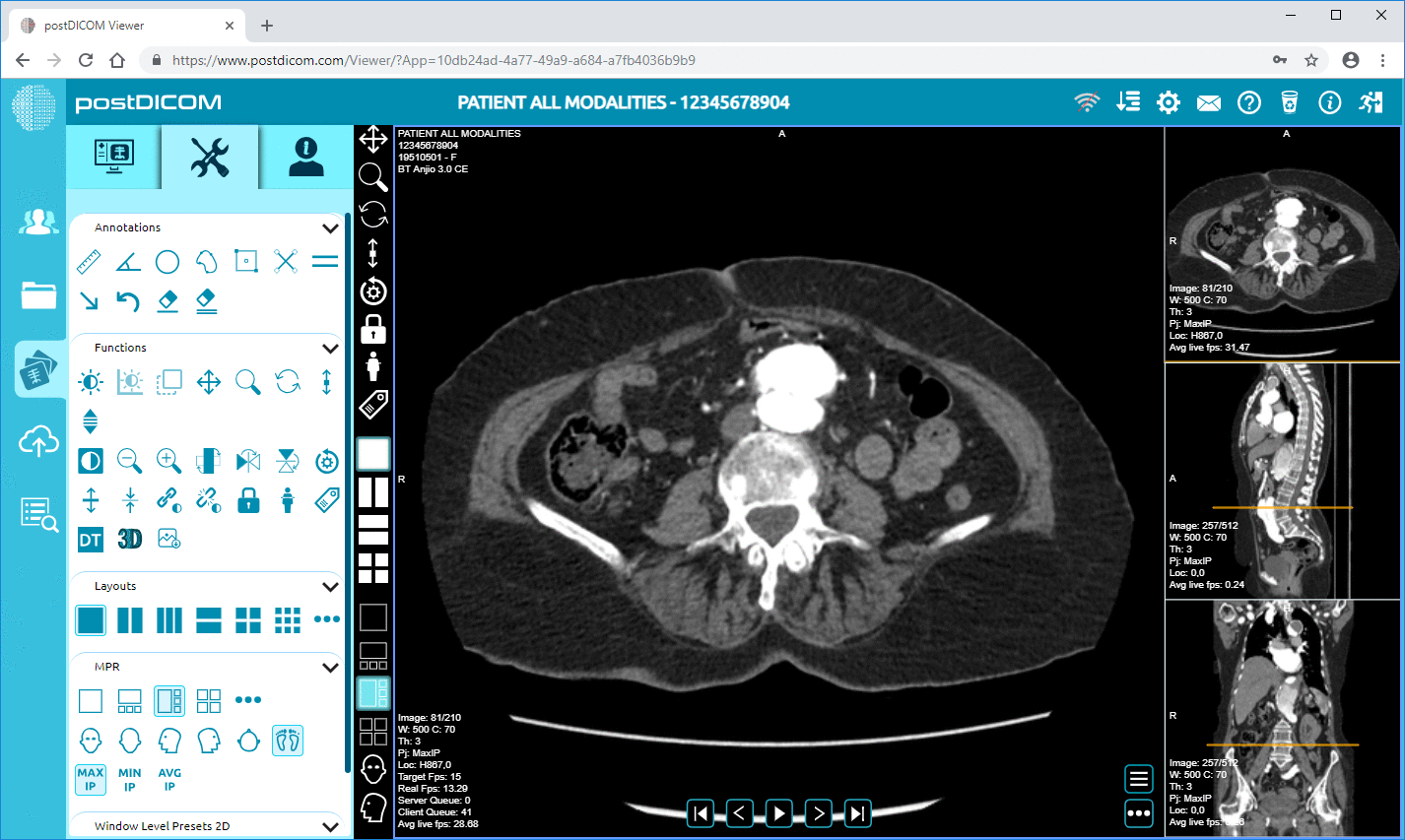
As healthcare steadily moves into the digital age, the adoption of cloud-based solutions is accelerating—especially in medical imaging. Clinics, hospitals, and radiology centers are increasingly turning to cloud storage for its ability to handle massive volumes of DICOM files without needing expensive local servers.
But as with all technological advancements, the shift raises a critical question: Is cloud storage secure enough to handle such sensitive patient data? This article will explore the benefits, risks, and essential safeguards of cloud storage in medical imaging. We'll also look at how to choose the right platform and why your selection plays a more significant role in security than you might think.
The short answer: Yes—when implemented correctly and responsibly.
Cloud platforms used by medical professionals today are built on robust security frameworks. Reputable providers invest heavily in protecting user data, far beyond what most clinics could achieve in-house. Still, it’s essential to understand how these systems secure data, and how they compare to traditional, on-premise servers.
Cloud-based storage often provides:
• Data Encryption Both At Rest And In Transit, Ensuring Files Are Unreadable Without Proper Credentials.
• Strict Access Control Mechanisms, So Only Authorized Personnel Can View Or Modify Imaging Data.
• Audit Trails, Which Log Who Accessed What And When.
• Built-in Compliance With International Regulations Like Hipaa In The U.s. And Gdpr In Europe.
Despite the built-in protections, risks still exist. Not from the concept of cloud computing itself—but often from poor implementation or partnering with vendors who cut corners.
A healthcare data breach is no small incident. It can expose thousands of patient records, damage your institution’s reputation, and lead to massive fines. One major cause? Improper configuration or weak access controls.
For example, if a radiologist logs in from a public network without two-factor authentication, it opens a door for cybercriminals. Similarly, phishing attacks remain a persistent threat, tricking staff into revealing credentials or clicking harmful links.
Cloud providers must encrypt your data and actively monitor for suspicious behavior, flag anomalies, and provide breach notifications.
Downtime is more than an inconvenience—it can delay diagnoses and treatments. If a cloud platform lacks redundancy systems or uptime guarantees, healthcare providers may find themselves locked out of critical imaging files when it matters most.
That's why reliable vendors offer:
• 99.9% Or Higher Uptime
• Real-time Backups
• Disaster Recovery Systems To Keep Data Intact Even In Extreme Cases
Healthcare providers have a legal responsibility to protect patient data. If a cloud platform stores data in non-compliant ways—or outside allowed jurisdictions—you could be facing serious legal trouble.
Choosing a vendor that complies with regulations like HIPAA or GDPR isn’t just a best practice. It’s non-negotiable.
Let’s say you're comparing different cloud PACS platforms or looking for a DICOM viewer free online. Here are the key features that separate trustworthy providers from risky ones:
Encryption ensures your files are scrambled and unreadable to anyone who doesn’t have the key. Top-tier vendors encrypt:
• Datain Transit(when Sent Over The Internet)
• Dataat Rest(when Stored In The Cloud)
This protects against both hackers and accidental exposure.
Not every user in your facility needs access to every image. With role-based controls, you can assign permissions based on responsibility—radiologists, for example, may have different access rights than front-desk staff.
This granular control reduces the chance of internal misuse or accidental data modification.
Your imaging data should remain safe, regardless of a natural disaster, cyberattack, or power failure. Cloud providers should offer frequent automatic backups, geographic redundancy, and swift restoration protocols.
Gone are the days of mailing patient CDs or USBs. Cloud platforms should allow encrypted, link-based sharing of images with colleagues, referring physicians, or patients—with control over how long the files remain accessible.
 - Created by PostDICOM.jpg)
Even the most advanced security features mean little if the platform lacks transparency, support, or compliance.
Here’s what to look for in a reliable cloud PACS vendor:
• Certifications And Audit Reports: Look for vendors who comply with ISO, HIPAA, or CE requirements.
• Transparent Security Protocols: Avoid platforms that can't clearly explain their security architecture.
• Support For Data Portability: You can download or migrate your data at any time without hassle.
PostDICOM is a trusted name in cloud medical imaging. It offers:
• End-to-end Encryptionandrole-based Permissions
• Ace-certified Diagnostic Dicom Viewer
• Secure Image Sharing And Archiving
• Afree Versionthat Lets Users Experience Full Functionality Without Long-term Commitment
While it’s not a permanently free platform, PostDICOM allows healthcare institutions to test the waters with no obligation—unlike many “free” online DICOM viewers that are either feature-limited or use your data in questionable ways.
Only if the vendor is available will you always verify that your cloud platform meets HIPAA or relevant regulatory requirements before uploading patient data.
Yes, but only if the platform allows it and has verified deletion policies. This is critical when patients request data removal under laws like GDPR.
Choose a provider that offers data portability. You should always retain full ownership and control of your files.
Use platforms with multi-factor authentication, user logging, and role-based access. Regularly audit user activity.
Cloud storage for medical imaging is not just secure—it’s often more secure than traditional systems, thanks to encryption, role-based access, and built-in compliance. However, not every vendor meets the necessary standards.
By understanding what to look for and what to avoid, you can safeguard your patients’ data while benefiting from the speed, scalability, and efficiency of cloud platforms.
PostDICOM offers enterprise-grade security, encrypted storage, and international compliance standards. Try the free version to experience the platform before making a long-term commitment.


|
Cloud PACS and Online DICOM ViewerUpload DICOM images and clinical documents to PostDICOM servers. Store, view, collaborate, and share your medical imaging files. |